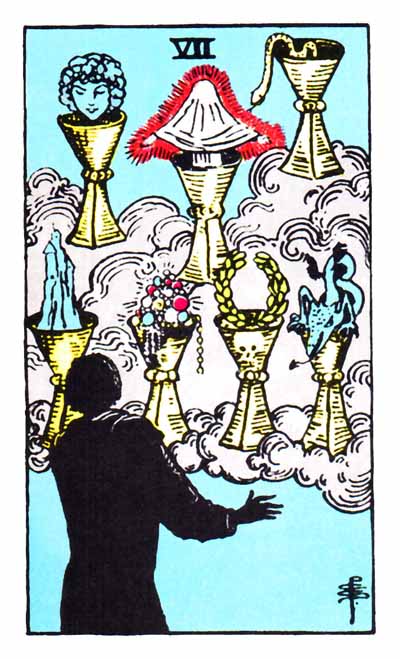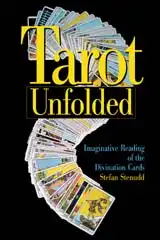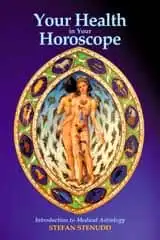|
TAROT
card meanings & free reading
|

What to Make of Tarot DivinationIs Tarot Reading Accurate, and If So — How?There's nothing scientifically proven in Tarot divination. To my knowledge, it hasn't been examined empirically or in any other scientific way.
Not that the universities and other research facilities would hurry to do so. The paradigms of what's possible and what's not exclude divination completely. If the Tarot or any other old method of divination would be proven to work, science must rewrite its basic laws of nature. That's not tempting at all to scientists.
Statistics vs. ChanceAs far as I can see, the only method by which to examine Tarot divinations scientifically, would be with statistics. The question to answer is: Are Tarot predictions correct more often than pure chance would have it?But that's difficult for several reasons. First of all, the Tarot predictions are rarely if ever clear enough to treat in statistics. It's never just a yes or no, or any other fixed response. The Tarot cards need to be interpreted, and that makes their divinations too vague for scientific analysis. Also, the foundation of scientific research regarding predictability is repetition: An experiment must be possible to repeat, with the same result. Before tested like that, it's just a hypothesis. Tarot divination is next to impossible to repeat, since every situation is unique and the Tarot only speaks in relation to one unique situation at a time. Divination by the Tarot and most other methods is too relative to be treated statistically or at all in a repeatable manner. That's because it incorporates chance: The cards are selected by chance, and therefore differ from one reading to the next. Shuffling the deck before making the Tarot spread is a way of letting pure chance do the choosing. It's the same with so many other divinations across the world. For example, in the Chinese divination by I Ching, chance decides what hexagram will appear. Using chance is the most common method of divination. But there are exceptions the most prominent one being the mother of all divination: astrology. In astrology, the birth horoscope chart of a person or event is used, and that is the same forever. Your birth chart doesn't change, so statistical approaches to testing the accuracy of astrology are possible, although not easy. Of course, it can be said that the birth chart itself is a consequence of chance how the planets happened to be positioned at a certain moment in time, as seen from a certain place on earth. Still, that initial configuration remains. Not so with the Tarot spread. Each spread is relevant only at the time it's made. When done again at another time, the result is different as it should be, since life is such that every new situation has its own future ahead of it.
The Secret of ChanceSo, how could Tarot divination, working with chance as the main ingredient, be accurate about somebody's present situation and near future? Well, if that's the case, it must be because of chance, and not in spite of it.The implied thesis on which such divination methods operate is that chance is not chance at all, but a channel to truth beyond what our minds can normally reach. As if chance is governed by some meaning, a higher plan that the universe as a whole follows. As if the world is one operated by what we usually call a conscious divine power. That's surely why these methods of divination have seemed credible to people of the past. Many cultures, certainly those of the Christian tradition, believed that some metaphysical power with a specific intention was what controlled destiny. Before Newton, Darwin, and Einstein, they would have had great trouble imagining a universe run only by the mechanisms of its natural laws, sort of like a big machine appearing out of nowhere and somehow building itself. It's still hard to grasp... So, the Tarot and other chance based methods of divination assume that chance itself opens doors to the present as well as the future, revealing what's otherwise hidden by the limits of our own senses. As if when chance is introduced, the true fabric of the universe is exposed with all its workings, connections, and mysterious causalities. As if chance is really what leaks from the mind of god. Then divination like that of the Tarot is a way of inspecting how the first cause of the world works in it, whether that is to be called god, demiurge, Tao, or something else. If so how to prove that scientifically?
Self-ReflectionBut divination is rarely used in the same way as scientific findings are. We don't trust it completely in how we make our life choices not like we board a Boeing 747, trusting that the applications of modern science will take us to Tokyo, or we swallow penicillin expecting a mean disease to cease.Most people have a more light-hearted approach to it, which I find very healthy, if not to say wise. They regard the divination by the Tarot or any other means as a tool by which to reflect for a while on their lives, what situation they are in, and what might come next. It's a help in contemplation, and not a system by which to fill in one's calendar far in advance. That would also explain the traditional favoring of chance as an essential ingredient. When we look at ourselves, we tend to do that in a limited way, having trouble thinking so to speak outside the box. Chance creates a perspective over which we have no influence, so it helps us look at the same old same old, from a new angle. That's often quite rewarding, a great resource in reexamining our situation and coming up with new alternatives as to how to go from here. Not bad at all, and completely independent on whether the divination is accurate or not.
About Cookies
My Other Websites:I Ching OnlineThe 64 hexagrams of the Chinese classic I Ching and what they mean in divination. Free online reading.
Complete HoroscopeHow predictions are done in classical astrology with the full horoscope chart. Many examples.
Creation MythsCreation stories from around the world, and the ancient beliefs about the world and the gods as revealed by the myths.
Other Books of MineClick the image to see the book (and Kindle ebook) at Amazon (paid link).
|
 Tarot Unfolded
Tarot Unfolded


 Stefan Stenudd
Stefan Stenudd